Exciting New Releases: ZD Toys Collection
Exciting New Releases: ZD Toys Collection

Exploring the Best Moments from the Fantastic Four Films: Character Arcs and Legacy
April 24, 2025 13 min read
They were Marvel’s first family — cosmic explorers forged in radiation and bound by love — and yet, for all their legacy, the Fantastic Four have remained curiously absent from the tapestry of the MCU. Their echoes, however, linger. Before shared universes became the norm and cinematic sagas spanned galaxies, there was a 1994 adaptation that never saw the light of day. Shot and shelved, it became a myth — a ghost film whispered about in fandom corridors.
Then came the Fox-era attempts — bold, ambitious, and fractured. These films made it to theaters, igniting curiosity and stirring nostalgia, even if they often stumbled under the weight of expectation. The reception was mixed, the storytelling uneven, and the portrayal of Doctor Doom — one of Marvel’s most terrifying intellects — never quite captured the storm behind the mask.
And yet… there were sparks. There were scenes that breathed. Moments where Reed’s burden of brilliance felt real, where Johnny’s flame burned with reckless heart, where Ben’s stone skin cracked just enough to reveal the soul beneath. Dialogue that hinted at something more — the unbreakable, messy, human connection at the team’s core.
All of it only fuels the anticipation. Because now, as the MCU gears up to finally welcome them home, fans remember: the Fantastic Four were never just about powers. They were about family, failure, and forging light in the void. And maybe this time, their story will stretch beyond the stars and finally land where it belongs — in hearts.
Four Little Words That Can Change Our Lives Forever…
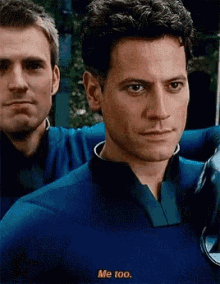
Sometimes, it’s not the explosions or the cosmic clouds that echo the loudest — it’s the quiet before. A pause. A breath. A line that lingers.
In Fantastic Four (2005), long before Victor von Doom’s name became synonymous with steel and vengeance, there was this moment. Small. Seemingly romantic. Almost human. Four words, he says — “Four little words that can change our lives forever…” He’s poised to propose to Susan Storm, a woman who stands radiant not just in beauty, but in brilliance. But this isn’t a love story. Not really.
Because the moment he opens his mouth, the clouds begin to stir — literally, and metaphorically. Reed Richards, ever the man of science, interrupts with urgency: “The cloud is accelerating!” And just like that, Victor’s fragile attempt at vulnerability gets buried beneath solar winds and cosmic destiny.
The film uses this moment as a signpost — a disguised foreshadowing of what’s to come. What looks like a romantic gesture is really the start of a downward spiral. It’s clear that while Susan might entertain the idea of a partnership, her heart is elsewhere, lost in equations and quiet glances toward Reed. Doom’s proposal, couched in corporate lingo and hollow ambition (he calls it a “promotion”), reveals everything: his obsession with control, his need to possess, his misunderstanding of love.
This isn’t just about a failed proposal. It’s about the fracture in Victor’s soul, the spark that begins his transformation. It's about unrequited love simmering into ego, and ego twisting into wrath. And it all begins with four little words that promised forever — and delivered a storm.
“I Just Want My Work To Make A Difference.”
— Reed Richards, from a trailer line that never made it to the final cut.
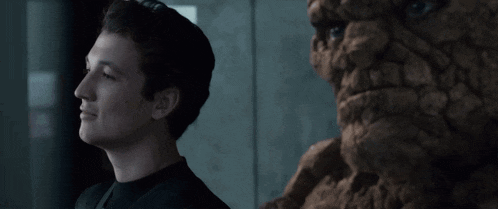
There are moments — fleeting, unfinished — that say more than an entire film can. Josh Trank’s Fantastic Four (2015) was a bold attempt at reinvention, an experiment meant to breathe new life into Marvel’s first family under a darker, grittier lens. But somewhere between the studio boardrooms and the editing room floor, the film lost its shape… and its soul.
Still, there were fragments. Glimpses of something real. And one of the most poignant came not in the final product, but in the trailer — a single exchange that encapsulated everything Reed Richards could be.
Sue Storm: You want to be famous?
Reed Richards: I just want my work to make a difference.
It’s quiet. It's not flashy or grandiose. But it's true. In a world where science can be weaponized and innovation sold off to the highest bidder, Reed stands as something else entirely — a rare constant in a chaotic universe. A mind that could reshape reality, but a heart that simply wants to help it.
This is who Reed Richards should be. Not just the smartest man in the room, but the one who listens hardest. The one who never craved fame or fortune, only function — a purpose. A solution. A better tomorrow.
And that line — that single trailer line — was a spark. A reminder of the potential buried beneath the rubble. It didn’t make it into the movie, but it made it into our understanding. Reed doesn’t chase the spotlight. He builds it, so others can see.
And maybe… that’s what makes him truly fantastic.
“I’m hot. You’re… well, you’re a little limp. Sue’s easy to see through. And Ben’s always been a hardass.”
— Johnny Storm, roasting his family with the ease of a flame catching wind.

The Fantastic Four were never just about powers — they were personalities in friction, elements in orbit, a dysfunctional family forged in cosmic fire. Each member, a facet of something deeper. Something human.
Reed Richards, ever the methodical mind, tries to break down their mutations with logic, trying to trace back symptoms to science. But Johnny — brash, burning, brilliant in his own reckless way — answers with humor. With flame. With truth disguised as jest.
He quips without filter. He jabs with charm. And yet, beneath the smirk lies something real — a glimpse of how well he knows them all. Reed, always overstretched and unsure. Sue, guarded but glowing. Ben, solid to a fault, aching behind the stone. And himself? He knows exactly who he is — too fast, too loud, too much.
Johnny Storm starts out selfish. A showboat. A thrill-chaser. The kind of guy who laughs too loud and cares too little — or so it seems. But buried beneath the swagger is someone desperate to matter. Desperate to be seen beyond the flame. His insults? Camouflage. His recklessness? A mask for fear. Because Johnny is still figuring it out — what it means to be a brother, a hero, a man worth the name "Storm."
And that’s the beauty of this team. They clash. They burn. They bend. But they never break.
Because no matter how sharp the joke or how hot the temper — family holds. Even when stretched thin, made invisible, turned to rock, or set on fire.
"When your world is destroyed, and I’m all that’s left… then it will be enough."
— Victor Von Doom, no longer man, no longer mercy.
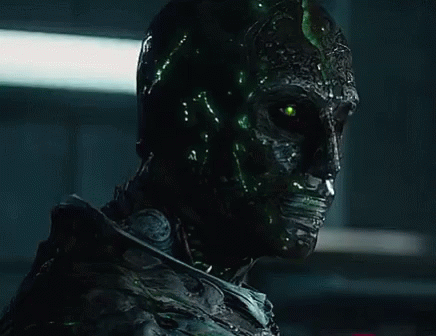
There’s something haunting about the way he says it — not like a villain basking in his conquest, but like someone who’s already mourned everything else. In Fantastic Four (2015), for all its chaos and confusion, there are shards of something more — and in Doom, we see it glinting through.
Victor von Doom was never meant to be ordinary. A brilliant mind, sharp and solitary, he walked the line between genius and arrogance long before the transformation. Toby Kebbell’s version may be younger, more modern, more alien — but the bones of the character are there. Not just in his powers, but in his pain.
He was a scientist once. A dreamer. The kind of man who stared into the void and wanted to understand it — maybe even tame it. But ambition, when wrapped too tightly around ego, becomes a ticking time bomb. And when Planet Zero consumed him, it didn’t just change his body. It stripped him bare. All that was left… was doom.
Not the comic book tyrant in green armor. Not yet. But something more tragic. A man so broken, so betrayed by the world — and perhaps himself — that annihilation felt like justice. He doesn't seek conquest out of greed. He seeks erasure — of a world he sees as flawed, corrupted, undeserving. It’s not power he wants. It’s peace… through total silence.
That line? It’s not just a threat. It’s a requiem. A whisper from someone who believes that if he’s the last thing left standing, maybe then, finally, the universe will make sense.
And that’s the real terror of Doctor Doom — not the blasts or the cape, but the belief. The cold, unshakable belief that he must be the end of everything… because he’s the only one who understands how it should’ve begun.
"To quote a friend of mine: It's Clobberin' Time!"
— Johnny Storm, finally fighting with heart instead of ego.
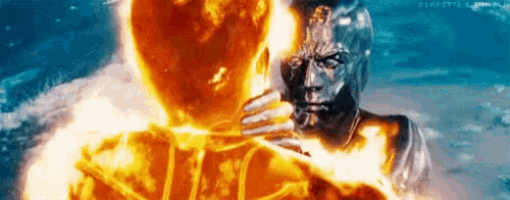
Johnny Storm has always been fire — fast, flashy, untouchable. The kind of guy who turns every mission into a spectacle and every moment into a punchline. But in Fantastic Four: Rise of the Silver Surfer (2007), something shifts. For the first time, the heat isn’t just for show. It’s for them — for his family.
After a brush with the Silver Surfer scrambles his powers, Johnny is forced to live, moment by moment, in the skin of his teammates. He feels what it’s like to stretch too far like Reed, to disappear like Sue… and most painfully, to walk in the stone-heavy steps of Ben Grimm.
Ben — the man Johnny never stopped teasing. The rock-solid foundation of the team whose power came with a terrible cost. While Johnny could still charm a crowd or steal the spotlight, Ben became something the world couldn’t look at without flinching.
And in that climactic moment, when Doom rises again and the world threatens to crumble, Johnny doesn’t crack a joke. He doesn’t smirk. He remembers. He honors.
He borrows the battle cry that never belonged to him — not to mock, but to carry forward.
"It’s Clobberin’ Time."
It’s not just a line. It’s a sign of growth. A spark of empathy. A brother standing up for another, not because he has to… but because he finally gets it.
In that instant, Johnny isn’t the Human Torch. He’s something more. He’s part of something bigger than himself. And for the first time, the fire isn’t about him — it’s about them.
"Do you really think fate turned us into gods so we could refuse these gifts?"
— Victor von Doom, blinded by power, cloaked in destiny.
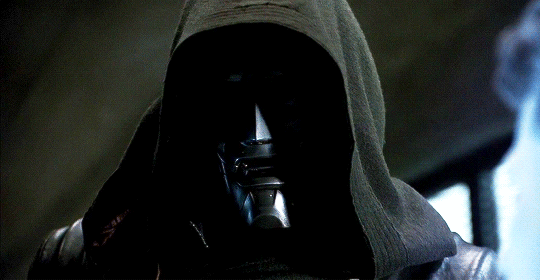
Power doesn’t just change people. It reveals them. Strips away the mask. What’s left behind? That’s who they always were.
In Fantastic Four (2005), as the story nears its climax, Victor von Doom — once a man, now something far more dangerous — stands tall in the illusion that he’s been chosen. Not cursed. Not mutated. Chosen. He looks at his newfound abilities not as responsibility, but as divine right. As proof that fate wants him to rise. To rule. To dominate.
"Do you really think fate turned us into gods so we could refuse these gifts?" he asks, not like a man, but like a messiah carved from delusion.
But across from him stands Susan Storm — a woman who once knew him, maybe even loved him. And it’s she who sees through the thunder and grandeur. Through the statue out front, through the charm and wealth and speeches. She knows the truth. Victor didn’t become a god overnight. He always thought he was one.
And when he tries to defuse her defiance with a soft voice — “Susan, let’s not fight.” — she doesn’t flinch. Doesn’t fade.
She answers with clarity: “No, let’s!”
This isn’t just a battle of powers — it’s a battle of philosophies. Of hearts. Doom sees gifts and claims divinity. Sue sees danger and defends humanity. One worships the self. The other protects the world.
Victor's question isn't a question at all. It's a confession. Of arrogance. Of hunger. Of the man he always was beneath the suit. And Sue? She answers with fire forged in compassion. She doesn’t just reject his godhood — she calls it what it is: ego in disguise.
Because real gods don’t need to declare themselves. They show up. They stand firm. And sometimes, they wear force fields and carry the weight of broken friendships on their shoulders.
"We are not gods, just people. And we are stronger together than we are apart."
— Dr. Franklin Storm, a father first, a scientist second, and a believer always.

In Fantastic Four (2015), amidst the chaos and crumbling ideals, it isn’t a superhero or a soldier who tries to stop the storm — it’s a father. Dr. Franklin Storm stands in front of the monster that used to be Victor, and he doesn't lift a weapon. He lifts his voice. His heart.
Victor von Doom has returned, no longer a young genius with a chip on his shoulder, but a force of raw destruction — a ghost of what could’ve been. He walks through the halls not with purpose, but with rage. Bodies fall. Lights flicker. And yet, when he confronts Franklin Storm, the old man doesn’t flinch.
"We are not gods, just people."
It’s not just a plea — it’s a declaration. A truth forged in years of watching brilliance turn bitter.
Franklin doesn’t speak in equations or threats. He speaks in hope. In unity. Because he’s seen what it means to build something greater than yourself — not in labs, but in people. In family. His words aren’t about Doom. They’re about all of them. Reed. Sue. Johnny. Ben. The world.
"We are stronger together than we are apart."
That’s the thesis. The heart of the Fantastic Four. The quiet, beating core beneath the sci-fi and spectacle. Doom isolates. He controls. He destroys alone. But the Four? They fight. They heal. They build — together.
Victor turns away from those words. And in doing so, he turns away from salvation. From being part of something bigger than himself.
But Franklin’s message survives him.
And when the Four finally rise, battered but unbroken, it’s not just to stop a villain — it’s to honor that belief. That together, even ordinary people can overcome impossible odds.
Because they were never meant to be gods. They were meant to be a family.
"Treasure each moment with her... and tell her she’s right. We do have a choice."
— The Silver Surfer, once a herald of destruction, now a voice of hope.

Sometimes, the most powerful thing in a story filled with cosmic energy and world-ending stakes isn't the explosion, or the showdown — it's the stillness. It's the pause before sacrifice. It's the truth whispered in the aftermath of death.
In a film racing toward the arrival of Galactus, the Devourer of Worlds, the Fantastic Four stand not just against force, but fate. And as everyone scrambles for weapons, plans, and strategy, it’s Sue Storm — the soul of the team — who chooses compassion. She sees the humanity buried beneath the metallic skin of the Silver Surfer. She sees the man behind the power.
She doesn’t strike. She speaks. Not in fear, but in faith.
And in doing so, she awakens something long buried within him — choice.
By the time the Surfer rises again, now fully aware of who he is and what he’s done, it's no longer about duty to Galactus. It’s about a second chance. A moment to right what’s wrong.
When he returns to save Sue — when he resurrects her with a quiet surge of cosmic light — the act isn’t just miraculous. It’s personal. And as he turns to Reed, he leaves him not with data or commands, but a gift:
"Treasure each moment with her… and tell her she’s right. We do have a choice."
That line isn’t just about him. It’s about all of us. That no matter how far we fall, no matter how dark the universe becomes, there is always the ability to choose love. To choose compassion. To choose us.
The Surfer doesn’t just defy Galactus — he defies the narrative that power must always lead to domination. He reminds us that even the herald of destruction can become the shield that saves the world.
And sometimes, the universe changes… not with a blast, but with a whisper: “She’s right.”
"I put all of my faith in them."
— Dr. Franklin Storm, believer in potential, builder of futures.
Before the stretch of dimensions, before the storm of powers, before the collapse into chaos—there was belief. Simple. Unshakable. Pure belief.
Dr. Franklin Storm didn’t see his team as liabilities. He didn’t see kids fumbling in labs or outsiders chasing wild theories. He saw possibility. He saw the seeds of something greater — not just a breakthrough in science, but a breakthrough in humanity.
When the boardroom questioned him, when the older, more seasoned voices doubted the mission, he stood his ground. Not with arrogance. Not with defiance. But with faith.
"You're right. I didn’t. I stayed in and studied like a good little nerd..."
— Reed Richards, finally stepping into his own.
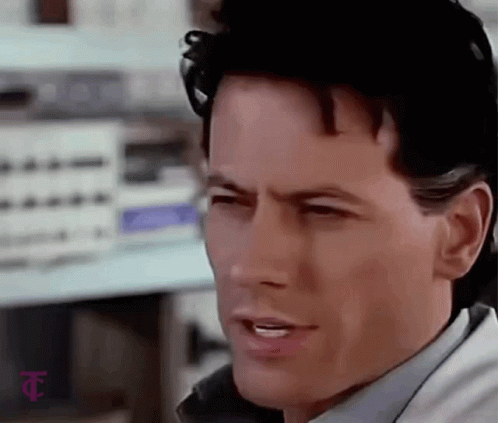
It’s funny how the world loves to box people in. To reduce them to their labels. The nerd. The jock. The leader. The follower. And Reed Richards? He was the nerd. The one who stayed inside, books piled high, the world of the popular kids rushing by him like a storm. He didn’t play football. He didn’t chase glory. He didn’t care about fitting in.
Instead, he put his faith in something else: knowledge. The quiet power of thought, of curiosity, of what could be built beyond the surface. And, years later, when the world needed him, when General Hager — the self-proclaimed “quarterback” of the situation — tried to belittle him, Reed finally spoke the truth he’d always known but never said out loud.
"I stayed in and studied like a good little nerd. And fifteen years later, I’m one of the greatest minds of the 21st century."
There’s a certain power in that moment. It’s not just about the science or the superhero mantle. It’s about self-acceptance. Reed Richards isn’t just apologizing for his intellect anymore. He’s owning it. And more than that, he’s owning his role — not just as the smart guy, but as the leader.
Because being a leader isn’t about popularity, or strength, or high school stats. It’s about wisdom. It’s about being the one who can see the pieces no one else can, and having the confidence to say, “I’m the one who knows the way.”
And when Reed says, "I’m engaged to the hottest girl on the planet," it’s not just a throwaway line. It’s him acknowledging that he’s no longer the sidekick. He’s no longer the underdog. He’s the one. The one everyone should respect.
That moment with General Hager? It’s a quiet revolution. Reed steps forward, not because he’s the strongest, but because he’s the smartest. And, in the end, it’s the mind that truly leads. And with that clarity, with that brilliance, Reed shows Hager — and us — exactly who he is. The most formidable leader, not because of his powers, but because of his mind.
As we look back at these defining moments from the Fantastic Four films, it's clear that the team’s journey has always been about more than just cosmic battles and superhuman abilities. At its core, it’s about the growth of individuals learning to embrace their true potential and strengths — whether it’s Reed Richards finding his voice as a leader, Johnny Storm discovering the importance of camaraderie, or even Doctor Doom's tragic fall into the depths of his own ego.
Each film, with its triumphs and missteps, offers us something invaluable: the reminder that real power comes from embracing who we are, accepting our flaws, and learning to work together. The Fantastic Four, despite their otherworldly abilities, are not defined by their powers alone — it’s their humanity, their relationships, and their willingness to fight for a better world that truly make them legends.
So, as we eagerly await the MCU’s take on Marvel's First Family, let’s take a moment to appreciate the legacy these films have laid down. They remind us that even in a world filled with larger-than-life heroes and villains, it’s the heart and the mind that will always be the most powerful force of all.
Subscribe
Sign up to get the latest on sales, new releases and more …
